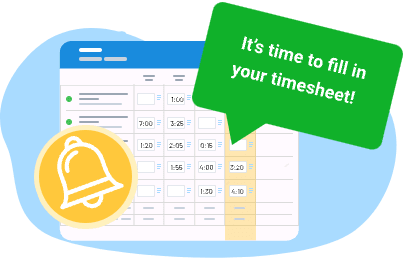“TIME IS MONEY”
As beaten as this phrase is, its truth is undeniable in the software industry, where the success of a project largely deneds on the speed of its realization and the ability of the team to preven schedule delays.
Besides, when a software company works for clients and charges them per hour of service, it has a compelling need to keep a record of billable time carefully and precisely. Guesswork isn’t a great option in this case, and forgetfulness may actually result in loss of revenues.
For this reason, efficient time tracking is so crucial for developers, programmers and other software professionals, regardless of whether they do their job independently or a part of a large team. And in this article, we will explain how to set up a well-functioning time tracking routine for your software business.
1. Use a Smart Time Tracking Tool
Digital time trackers have several significant advantages over paper-and-pencil instruments or Excel spreadsheets:
- They process time tracking data quickly and infallibly, saving much time for you;
- They visualize performance statistics in graphs and charts, making it easier to analyze team productivity and progress;
- They include many additional features that allow for a more streamlined work process in general;
- Plus, many digital and web-based tools can track hours automatically, which increases precision and eliminates errors in data collection.
Manual-entry software and automatic timers are equally good. In case you want to boost productivity and need a thorough summary of your time use behaviors, an automatic time tracker, such as actiTIME Timer, will work best for you. If you just need to comply with overtime regulations or collect data for project estimation, invoicing and payroll accrual, a manual-entry tool will serve you well enough. In other words, the choice of a particular type of software depends only on your needs.
2. Track Both Billable and Non-billable Tasks
The reason for tracking billable time is obvious – it helps to figure an accurate price for the development and programming services you render and make sure that no loss in profit is taking place.
As for the tracking on non-billable time, it allows for determining the real cost of projects. You may charge clients merely for software development, but you also do research, engage in brainstorming, communicate with stakeholders and analyze project results upon completion. Though these tasks are non-billable, they take time and, thus, incur expenses. When tracking them as diligently as billable tasks, you develop a more realistic picture of project profitability.
3. Focus on Simplicity
It’s great when a time tracker is sophisticated enough and has plenty of advanced and helpful features. However, the simplicity of use is a priority in case you’ve just started to explore how time tracking works or plan to integrate a new piece of software into the workflow of a relatively large team with a small number of tech-savvy employees.
Resistance to change may occur even due to an insignificant innovation or transformation. To minimize risks, choose a user-friendly tool that won’t be difficult to adopt, such as actiTIME. Later on, if you decide that more complex software functionality is needed for better business outcomes, you may expand it with various add-ons and integrations or switch to an entirely new product.
4. Explain Why Time Tracking Is Important
Continuing with the issue of resistance to change, people are generally reluctant to alter their behaviors when they don’t perceive any direct advantage in doing so. Therefore, it’s pivotal to discuss with your team members why time tracking is good for everyone.
If developers in your team are paid per hour, it won’t be hard to convince them in the value of time tracking since, basically, the size of their wage depends on the accuracy of daily timesheet entries. But if you or your team members have fixed salaries, it will be helpful to focus on long-term benefits of time tracking:
- Increased productivity,
- More streamlined and less time-consuming billing process,
- Better management of expenses, etc.
Be sure to communicate these and other values of time tracking to your team, and don’t forget to align them with employees’ personal interests for stronger motivation.
5. Don’t Use Time Tracking Data for Employee Criticism
Another reason why your team members may resist the adoption of a time tracker is the fear that the tool could be used to criticize their performance and control their behaviors. With many software products offering a GPS tracking feature and taking screenshots of users’ workstations once in a while, such a fear is reasonable indeed. However, even the most simple of time trackers can be abused by managers in an attempt to evaluate the quality of employees’ work.
TRY TO AVOID THAT BY ALL MEANS. Don’t rely too heavily on time tracking statistics when appraising your team members – there are many more factors defining the quality of developers’ performance than the amount of time spent on tasks.
Note that if you are going to apply time tracking for employee appraisal after all, the accuracy of data may suffer severely since your employees will be more likely to engage in timesheet cheating in order to protect themselves from manager disapproval. Therefore, utilize a time tracker only to assess the overall project and business performance rather than the work of individual employees. In this way, you’ll help not only your team members but also yourself.
6. Track Work Hours Daily
By Friday night, the majority of us are incapable of recalling how much time was spent on tasks throughout a week. Therefore, if you fill timesheets weekly or even rarer, your time tracking data is prone to be highly imprecise and full of errors.
In contrast, even manual time tracking can free you of guesswork and the toils of recollection when performed daily. And if you record the number of hours spent on a task right after the work is completed, the accuracy of time tracking data increases multifold. It’s not necessary to be a perfectionist and track working time up to every single second, but the more precise your time entries are – the more benefits you and your business gain.
7. Establish Organization-Wide Time Tracking Rules
Policies and standards keep organizational processes in order and make sure that no essential piece of information is lost. Thus, consider developing organization-wide time tracking guidelines.
Don’t forget to state the desired frequency of timesheet completion in this document and take into account the following:
- Which basic time entry requirements will your developers have to adhere to?
- Who will supervise the time tracking process, and how often will they check colleagues’ timesheets?
- How frequently will the filled timesheets get locked to prevent changes?
- Will your team members have to add comments and notes to their time entries and on which occasions?
- Will there be a specific system for project / task creation, naming and categorization?
Besides, add some tips and explain the best practices in this guide to help your employees integrate time tracking into their daily routine faster.
8. Find Someone to Check on Timesheet Completion
To ensure that time tracking is implemented properly and produces maximum positive results, it would help to have someone on your team to check others’ timesheets regularly, especially at the initial stages of practice adoption.
If you think that such a role is rather unnecessary, try to find and employ a time tracker that can be configured to remind users to fill in timesheets by the end of each workday. actiTIME is a good example of such a tool – it lets you set up preferable notification rules, customize message contents and choose when and how often users will receive their reminders.
9. Track Progress Against Deadlines and Estimates
Time estimation serves significant purposes. It helps managers prevent cost overruns and utilize human and time resources in an optimal way. Thus, when you track time against project estimates and deadlines, you become able to control labor expenses better and see how efficient your employees are at work. In other words, estimates can be used as one of the key performance criteria – if you’re not successful enough in adhering to them, some changes in your management practices and decisions must take place.
By the way, actiTIME can be implemented to develop very accurate time estimates for your development and programming projects. We thoroughly described the way you can utilize time tracking data and the tool’s functionality for this aim here. Feel free to check it out if you could use some help when estimating tasks.
10. Analyze Time Tracking Data Purposefully
The ultimate value of digital time trackers is in their data reporting features. These tools easily process all the information submitted by users and then present it to you in a readable and visually appealing format – in diagrams, tables, graphs, etc.
In actiTIME, for instance, you can overview personal time use trends in a beautifully designed chart or run detailed reports on team performance, project costs and revenues. Your only job is to closely examine these time tracking reports and apply them to find answers to the questions that bother you most:
- How long is it taking to complete a project and why?
- How much should we charge our clients to remain profitable?
- How much did my team members or I earn?
- How profitable is our new project?
- How accurate are our task estimates, etc.?
Create a list of questions to drive the process of data analysis and enjoy the enhanced performance results once the issues are tackled.





Top comments (1)
Great post! Time management is essential in the freelancers' world. That's why I always use task management software with time tracking to manage my projects. So far, I like to use Trello and Quire. I can put an estimated time, not miss any billable hours, and start focus time sessions. Really improved my productivity!